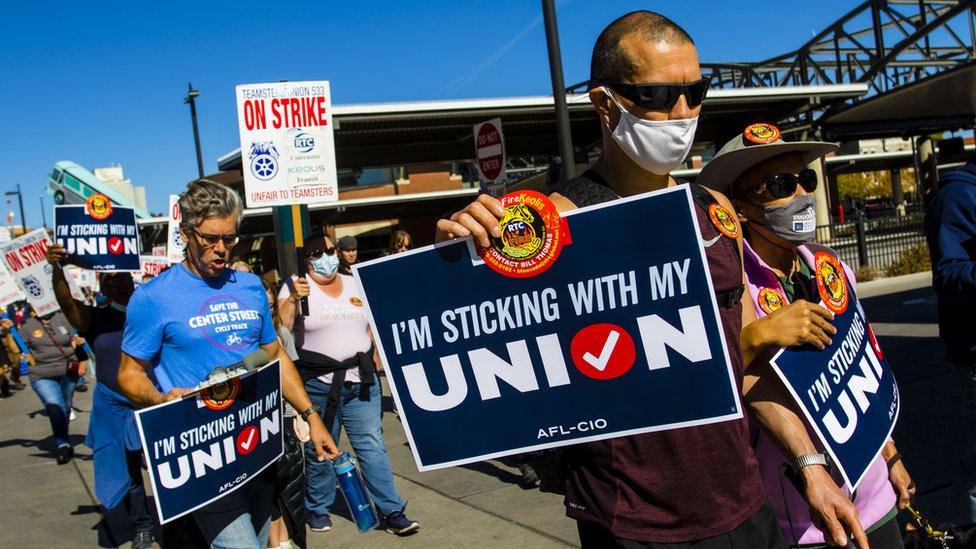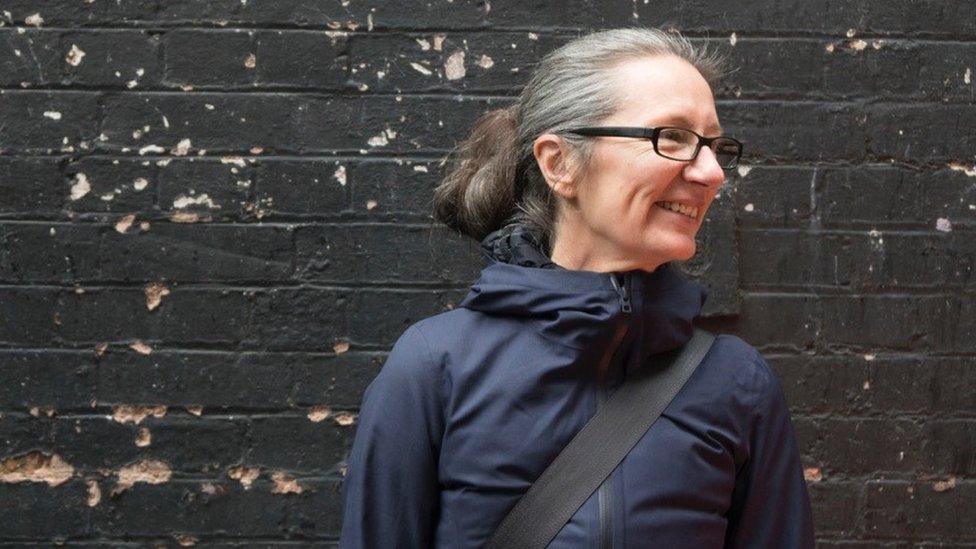Are we entering a 'golden age' for trade unions?
- Published

The pandemic has led to an increase in union membership and worker activism
Shyamlee Patel is part of a growing trend on both sides of the Atlantic - she has joined a trade union since the start of the pandemic.
Ms Patel, who lives in New York, works in the finance department of a US conservation group.
She and her colleagues unionised last year following redundancies at the organisation. Their decision was also in response to independently substantiated allegations that female employees and people of colour were being treated unfairly., external
"As a woman of colour, seeing it put on paper that women of colour have a harder time at the organisation ascending the ranks and being treated as equals, that really reinforced my decision to unionise," says Ms Patel.
"The union movement aligns with my values, and what I hope for the future."

Shyamlee Patel joined a union after an unhappy experience at her employer
In the US and the UK, trade unionism and worker activism has seen a resurgence over the past two years, as the job cuts caused by coronavirus lockdowns have made people more aware of the insecurity of their employment.
Union membership in the UK rose by 118,000 to 6.6 million in 2020,, external the fourth year in a row that it increased.
One of the largest unions, Unite, said in May of that year that "tens of thousands" had joined up "because they are very frightened" about the risk of redundancy., external
Across in the US, the percentage of US workers who belong to a union rose to 10.8% in 2020, from 10.3% in 2019. This was due to "disproportionately" more non-unionised staff losing their jobs during the pandemic, , externalaccording to the US Department of Labor.
And while the overall level of US union membership remained flat, it increased among workers aged 25-34. Membership from within that age bracket rose from 8.8% of workers in 2019 to 9.4% in 2021., external
Ms Patel and her colleagues at The National Audubon Society, a bird conservation organisation, joined the Communications Workers of America (CWA), the largest US union in the public relations and media sector.
The CWA is now representing the employees in contract negotiations with Audubon's management. In regard to the controversy at the organisation, Audubon said in a statement last summer that it was "taking steps... to strengthen its governance practices"., external
Sara Steffens, secretary-treasurer of the CWA, says she is thrilled by the rise in young people joining unions. "It's something I've waited my whole life to see," she says. "When people see all these other workers organising in very public ways, they're beginning to understand that a union is a real option".

Sara Steffens is "thrilled" to see union membership increase
One group of workers that were particularly badly hit by Covid-19 were freelancers. They more often lost their work more quickly than salaried employees, and had a harder time getting government support.
Paule Constable, a lighting designer, is one of the 70% of theatre workers in the UK who work on a freelance basis. When theatres were forced to shut during the pandemic, her income stream disappeared.
"As a freelance workforce, we were made redundant with no conversation," she says. "I'm a limited company and was able to furlough myself, but I was one of the lucky ones - 65,000 freelancers were [initially] left with no support at all.", external
To help other freelancers in her industry Ms Constable set up a lobbying group called Freelancers Make Theatre Work. "Nobody was talking for freelancers," she says. "If groups of freelancers hadn't come together and developed some grass roots organisations we'd be in bigger trouble than we are."
Ms Constable also became a member of TV, film and theatre workers' union Bectu after the union's decision last year to launch a branch for freelancers in theatre. "Bectu has done a lot of work recently, in areas such as mental health and wellbeing support that are hugely problematic for the freelancers in our industry," she says.

Paule Constable set up an organsiation to help other freelancers within the theatre sector
Deborah Foster, professor in employment relations and diversity at the University of Cardiff, says that home working during the pandemic has increased interest in unions, because such people "want to be part of a collective community".
Michael Murray, a Boston-based account manager at US software company EveryAction, confirms that feelings of isolation during the lockdowns were part of why he formed a union last year with his co-workers. "Workers across America are realising we have power and should make our voices heard," he says.
"I definitely felt more connected to my colleagues through organising."
Asheem Singh, a senior economist at The Royal Society of Arts in London, also cites home working as one reason why he joined a union for the first time during the pandemic. He became a member of Prospect, which represents professions including engineers, scientists, managers and civil servants in the UK.
"[Union membership] has given me a sense of control and agency," he says. "This is a golden age for unions. You have a perfect storm of reduced tolerance for bad practice at work, a breakdown in traditional channels of communication as people work in a more hybrid way, and an increased focused on mental health and wellbeing."

Asheem Singh says we are now in a "golden age" for trade unions
Mike Clancy, general secretary at Prospect, says it had 12,000 new joiners in 2020.
With the coronavirus pandemic now hopefully coming to an end, he says that issues his union are now addressing on behalf of members include people being able to disconnect from work outside of office hours, surveillance by bosses, and the continuation of flexible working.
Looking forward, he hopes that company bosses will return to meeting with union representatives in person, rather than via video calls.
"You can't protect and enhance the rights of workers solely from behind screens," says Mr Clancy. "We have a rising concern that employers could use the post-Covid environment to keep unions at arm's length long after the justification for it on public health grounds has gone."


New Economy is a new series exploring how businesses, trade, economies and working life are changing fast.

Yet, while many welcome the increased interest in trade unions, there remains hostility towards them from some companies - particularly in the US - who do not wish to have to negotiate with them over pay and staff conditions.
As the BBC reported last year, both Starbucks and Amazon have fought to prevent unionisation. Other critics of unions question how effective they are at saving jobs. In the UK, the recent high-profile sacking of 800 workers at P&O Ferries being a case in point.
However, very few organisations would challenge the right of unions to exist.
Ms Steffan of the CWA says that the pandemic has undoubtedly strengthened the labour movement. "The pandemic made it clear that it's workers and not executives that are essential in our economy," she says.